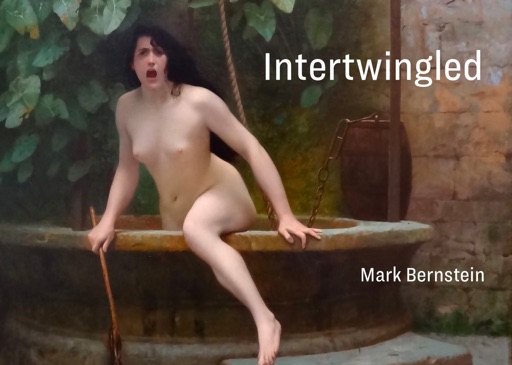The Shot And Danger Of Desire
An excerpt from Intertwingled.

Twenty Years On The Holodeck
Twenty years have elapsed since Janet Murray, in Hamlet On The Holodeck, argued that the future of new media lay in vividly immersive, encyclopedic and emotional interactive experiences rather than in the intertextual, allusive, lyrical and intellectual(ized) works that had epitomized new media through the preceding decade[Murray 1998]. Murray’s vision of immersive experience, of a platform where you could play cards with Sherlock Holmes or where you could be Prince Hamlet, been enormously influential throughout new media.
In these notes, I would like to call attention to a number of sources of disquiet that arise in composing immersive works in which the reader intentionally and effectually acts to change the events that take place in the story. These issues are not new but they have not been widely discussed, and drawing them together in this context may have some value.
These are not hypothetical or invented questions. Most actually arose in the course of my writing a hypertext school story, Those Trojan Girls. Others were familiar to me from editing and publishing hypertext fictions over several decades. Reflective practice is an important source of insight, and its judicious use can prove invaluable.
The Shot And Danger Of Desire
We may begin, alongside Murray, with the vision of inserting the reader into the story of Hamlet. We are not passive witnesses of the scene, nor minor players— not Rosencrantz or some third murderer, incapable of changing what happens. We are a prince! (I have noted elsewhere that, considered as a dramatic practice, this approach is not always promising: let a sensible person like you or me into a tragedy and the tragedy is prone to fall apart.)
What, on the holodeck, are we to do about Ophelia? She is an enigmatic character, one whom the 19th century found more fascinating than the 21st. Polonius speculates that Hamlet loves her; Laertes sees the prospect of a sexual relationship as a threat. If, as interactor, we have meaningful choice, might some combination of choices lead us to propose to marry Ophelia? To kiss her? To have sex with her?
All these choices are problematic. Can a simulated Ophelia marry? Specifically, can she consent? The presentation of meaningful choice within the fictive world leads us to the very threshold of the Turing Test, for the characters must necessarily be sufficiently convincing as to invite suspension of disbelief.
The choices, moreover, are ours, and the performance is ours as well. It is one thing to witness theatrical events that you cannot affect and that harm no one; it is another thing entirely to perform yourself what might be a crime. Holodeck Ophelia exists only for us. If we propose to make love to her, is her consent not coerced? Ophelia exists only as long as Hamlet remains interested in pursuing a romantic relationship or a sexual liaison. The imbalance of the power relation- ship is overwhelming, and indeed the holodeck must, if anything of dramatic importance is to be accomplished, make us forget that we are proposing to make love to a character whom we believe (or are led to believe) has free will but whose choices appear to be limited to either consenting to our advances or accepting (in one form or another) oblivion.
Paperback, 130 pages. isbn 1-8845-1156-2. Available October 1, 2019. Available now.